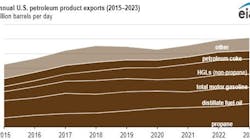Work has started at the United Nations European headquarters in Geneva to set up a fund to pay war reparations to Kuwait.
The fund formally came into existence when the Security Council accepted most of Sec. Gen. Javier Perez de Cuellar's recommendations to pay Kuwait for damage from Iraq's invasion. The U.N. administration in Geneva will be responsible for managing whatever system is agreed to extract oil revenues from Iraq and pay verified claims.
Preliminary--and so far unverified--estimates from Kuwait place war losses at $60 billion. Kuwait wants to recover that sum from its neighbor in not more than 10 years.
SETTING UP THE FUND
Establishment of the fund's administration will run parallel to discussions between the secretary general and other parties on the maximum percentage of Iraqi revenues that will go into the fund.
The U.S. has talked about a 50% limit but has warned that provision must be made for a situation in which oil prices rise sharply, enabling Baghdad to afford more than 50%.
Iraq estimates that during 1991-95 it will earn a little more than $64.2 billion in oil revenues. This is based on $16/bbl oil and the assumption that crude exports will resume this year and average 60,000 b/d in 1991, rising to 2.95 million b/d by 1995. With significant increase in oil prices, a 50% take during 10 years would be required to generate $60 billion.
However, without the resumption of oil exports, all the talk about the size of the reparations fund is academic. And until Saddam Husein is replaced, it appears unlikely the U.S. and many of its allies will agree to lift sanctions that have kept Iraqi crude off world markets.
Having set a ceiling on the percentage of oil revenues that will go into the fund, the governing board also has to choose one of five options put forward by the secretary general for diverting revenue into the fund.
ANOTHER NEUTRAL ZONE
A new suggestion for channeling oil revenues into the fund comes from James McDonald, a former vice-president of Tidewater Oil Co. who also worked closely with J. Paul Getty in the Neutral Zone.
McDonald reckons another Neutral Zone should be created, this time around Rumaila oil field on the border between Iraq and Kuwait. He says when quotas for members of the Organization of Petroleum Exporting Countries are reestablished, Rumaila should be given its quota--possibly 500,000 b/d--and this volume should be deducted from Iraq's production ceiling.
Rumaila oil would then be sold independently of Iraq's normal production and the income made available to the U.N. committee. At a theoretical $20/bbl, the new Neutral Zone would provide the U.N. fund with about $3.65 billion/year.
Rumaila alone would not provide the 50% maximum. But as McDonald points out in submissions to the U.S., Kuwaiti, and Saudi Arabian governments, it would be ironic justice for Iraq to lose the field after using allegations Kuwait was "stealing" oil from Iraq's portion of Rumaila as an excuse for invasion.
Copyright 1991 Oil & Gas Journal. All Rights Reserved.
